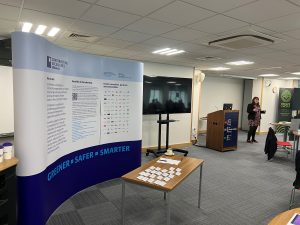A brand new theme group for CE Midlands members will start this autumn. Sue Woollett and Natasha Heritage from Stepnell will be co chairing the group and are keen to welcome new members so please get in touch if you want to get involved.
Sue says “We are committed to driving forward the social value agenda, ensuring that the construction industry not only meets but exceeds its responsibilities to society. By bringing together a diverse group of stakeholders, the Social Value Theme Group will champion initiatives that deliver tangible benefits to communities, enhance the environment, and promote economic prosperity.
We aim to facilitate an open forum for industry professionals to share insights, experiences and innovative approaches to social value with a central focus on recognising, reporting, and maximizing social value in all construction activities”
Key Objectives of the Theme Group
· Networking Opportunities through online and face to face meetings
· Support and enable companies to set targets, track progress, and demonstrate their contributions effectively
· Share best practice and opportunities for collaboration
· Recognise excellence
Meetings will be held quarterly online with an annual opportunity to meet face to face enabling us to recognise and celebrate excellence.
If you are a CE Midlands member please contact: tom.carpenter@cemidlands.org to join the social value theme group.
Sue Woollett is a social value manager for Stepnell’s East Midlands region. A relative newcomer to the construction industry, just five years ago, she has a background in volunteering alongside self-employment and employment in education and banking. She is strongly committed to equity and passionate about empowering people to improve their circumstances and experiences.
Natasha Heritage is a Social value manager for the Midlands region at Stepnell. She is passionate about social value, committed to creating meaningful change through her work and strives to make a positive impact in the local community. Previously she was a national team manager for a training provider, working with hard-to-reach NEETs and is currently completing a L4 qualification in Corporate Responsibility and Sustainability.
Following the election of East Midlands Mayor, Arup have published 7 ideas to transform the East Midlands. They aim to promote discussion and debate over opportunities presented by the devolution deal and establishment of a Mayor and EMCC.
A devolution deal for the East Midlands, and the election of an inaugural mayor, provides a once-in-a-generation opportunity to energise the region’s ambitions, and enduringly transform its relationship with national government.
The East Midlands has historically experienced persistent under-investment with local authorities and institutions lacking capacity and resource to advocate and maximise opportunities.
New local powers will help the region tackle challenges and harness its true economic potential. The East Midlands offers unique social, economic, and natural diversity – this devolution opportunity will allow the region’s individuality to be celebrated and harnessed.
We have used our global expertise, local knowledge and lived experience from working in the East Midlands for over 50 years to set out seven transformative ideas which can be used to inform conversations and key decision making. These ideas are designed around creating a sustainable and inclusive environment for people to live, work, learn and visit, with change being achievable in the first mayoral term.
You can download the document HERE:
The Installer Show caught up with Andrew Carpenter, Chief Executive of CE Midlands to find out about the role of CEM and how it is looking to overcome the housing crisis in the Midlands.
What is the goal of Constructing Excellence Midlands?
CE is a membership organisation that aims to drive excellence within the sector through innovation and collaboration. Membership is open to the entire supply chain and provides companies and individuals with the opportunity to influence the industry, network and exchange knowledge with like-minded organisations. We also provide a platform to engage with strategic research partners to help inform solution development and gain insight that you wouldn’t gain elsewhere.
At CE Midlands, our membership increased by 50% in 2023, highlighting the value that companies are placing on involvement with CE Midlands and the knowledge and insight that can be gained through membership.
What is the biggest issue that CEM is looking to address in the Midlands?
One of our key areas of focus in the Midlands is the creation of affordable housing. Development in this area is crucial as not only are we already in the midst of a housing crisis, but the population continues to grow rapidly with a diverse set of needs. So, there is a pressing requirement for not just affordable housing, but sustainable, inclusive and community-centric housing solutions. In turn, this growing demand is highlighting the urgent need that we have in this country for more effective housing policies.
In 2022 we set up a CE Midlands forum to deal with the specific issue of Social Housing sector, concentrating on the Future Homes Standard, which is open to all our members to join. Since then, the forum has welcomed a series of industry speakers who have each instigated lively debate and discussion with many valuable take aways available for those present, as well as providing an occasion for valuable networking opportunities for those working in this field.
What are the challenges when it comes to creating more affordable housing in the Midlands and elsewhere?
There are many challenges that need to be overcome. For example, the industry-wide skills shortage – both in terms of quantity and quality – especially in the wake of the Building Safety Act where competency levels are being brought into question. With an aging population and rising housing costs, we are seeing growing demand for multigenerational housing, meaning bigger homes need to be built. Add to that the need to consider accessibility and other varying social and cultural needs within the housing design. Finally, even if we could build more housing, there’s the issue of whether our outdated infrastructure could support it: would the electrical grid be able to supply a sudden influx in new housing stock in the area? There’s more to it than just building homes, they need to be well-designed, well-built and the surrounding infrastructure needs to be able to keep up with rising demand.
How can these challenges be overcome?
A forward-thinking and collaborative approach to housing is paramount. We need to inspire conversations and foster a shared commitment to creating a housing landscape that truly serves the diverse and evolving needs of the region’s residents.
There is huge potential for collaboration between the Government, private entities and local communities in order to drive community engagement and investment. We need to bring in initiatives that empower residents, encourage affordable cohesion and prioritise the creation of vibrant, sustainable neighbourhoods. After all, housing is much more than just bricks and mortar!
Of course, we must also embrace digital transformation, as innovations like smart infrastructure, sustainable design, and data-driven solutions can contribute to the development of more efficient and responsive housing that will continue to meet the evolving needs of its residents over time.
At CE Midlands, we are also advocating for the streamlining of regulatory processes in areas like planning, and the incentivising of sustainable development, to create an environment where affordable housing can grow and thrive.
You have also been working to engage young people on this issue through CEM’s Generation4Change (G4C) network. Can you tell us about that?
CE originally came into being on the back of a government report from 26 years ago, which said the industry was too fragmented and adversarial – a sentiment we have seen alluded to again recently in Dame Judith Hackett’s report. So, to continue to inspire collaboration, we introduced G4C with the idea that if we could create an arena for young construction industry professionals to collaborate with their peers, then collaboration would become their raison d’être, ready for when they became the leaders of tomorrow.
So, G4C is a national network that young professionals can use to connect, challenge and shape the future of the industry. Our G4C group in the West Midlands get together once a month with a guest speaker and once a quarter for a CPD session. They have also been arranging their own regular socials which is great to see! We currently have 300 young professionals attending G4C West Midlands events and activities, with such success that a G4C network is now being launched in the East Midlands based on the West Midlands model. I highly encourage young people from the sector who are interested in these issues to get involved in their local G4C group and start making a difference in their area.
For more information about the Installer Show here: InstallerSHOW 2024 – Constructing Excellence Midlands
This month Martyn Jones focuses on just one of the key drivers of change we will see this year – the Building Safety Act (BSA) – and muses on its impact and whether we’ve been here before.
Let’s face it, we’ve had a stream of initiatives over many years aimed at transforming our industry and, either explicitly or implicitly, exhorting us to change our culture and behaviours. There are far too many such initiatives and reports to list all of them here, but most notably they include the Simon Report way back in the 1940s, and more recently the Latham, Egan, and Farmer reports in the 1990s and 2000s.
We are once again being exhorted to embrace fundamental reform but this time in atonement for past mistakes, brought into stark light by the Grenfell tragedy, and in response to the passing of ensuing legislation, the BSA. Its key provisions came into force on 1 October 2023 and this year we will see the new rules for duty holders fully take effect, making it what many people are saying is the biggest change in building safety for a generation.
Under the BSA we now have a Building Safety Regulator (BSR), part of the Health & Safety Executive, as the new building control authority for all higher-risk buildings (HRBs) in England. Building work cannot start until they approve a building control approval application. They must be satisfied that the design meets the functional requirements of the building regulations.
The Regulator’s three-year strategic plan spans 2023 to 2026 and details a focus on: delivering consistent standards within the building control profession; overseeing improvements across the built environment; regulating planning, design, and construction of new HRBs; and ensuring those responsible for HRBs manage risk.
But beyond regulating HRBs and raising the safety standards of all buildings, they also intend (as attempted with some success by previous reports into the state of our industry and their prescriptions for improvement) to inspire and lead a much-needed change in our culture and behaviours right across the industry and the whole built environment.
The Regulator’s vision is of an industry where everyone is competent and takes responsibility to ensure buildings are of high quality and safe. They will introduce a new approach to building control in England by creating a regulated building control profession that is more accountable to all citizens and will see buildings consistently meeting building standards.
And there’s more. They intend to increase our knowledge of the built environment and will use this to drive improvements and support those working in the built environment to take responsibility for
driving a sustained and meaningful culture change, incentivising continuous improvement and, when necessary, addressing non-compliance.
The case for reform has been well rehearsed in previous improvement initiatives and reports into the state of the industry and repeated in part by the BSR in the foreword to their strategic plan. They identify a sector in need of fundamental reform having “a regulatory system that allowed egregious behaviour to go unchecked; homes clad in combustible materials that should never have been used; building owners failing to take responsibility; and regulators without the power or the capacity to enforce vital standards. These failures put at risk the lives of far too many.”
And this is just the initial phase of the legislation’s implementation. Further changes, including the reform of the building control system, are set to be implemented later this year. For example, on 6 April 2024, approved inspectors will need to apply to register with the Building Safety Regulator (BSR) to continue working as a Registered Building Control Approver (RBCA).
This date is also a critical month for in-scope buildings whose construction began before 1 October 2023. In cases like these, transitional agreements apply to individual construction projects to be completed under the current procedural rules and the existing approved inspector, provided they meet certain conditions, such as that work must be “sufficiently progressed” before 6 April 2024.
The BSR’s recipe for change is to create an environment where everyone – industry, residents, freeholders, leaseholders and more – is active in their responsibility for ensuring not only the safety, but also the quality of our buildings. Will we miss this opportunity to reform? Déjà vu all over again? Not really as we now have a Regulator whose task is to provide the clarion call for transformation and insist that we change our culture and behaviour.
Applications for Round 14 of the Co2nstructZero Business Champion programme are now open.
More information on the Co2nstructZero programme and priorities can be found on this link here.
In Round 13 they received a record number of applicants, this is really refreshing, and is a key example of the amazing work, happening across the industry to become Net Zero.
Complete the Business Champions interview form and submit it to Kayleigh.hyde@beis.gov.uk by COP 17 April. The programme welcome’s applications from across the sector and strongly encourages SME’s to apply.
Please note:
Questions within the application form relating to the Co2nstructZero Nine priorities, answers should demonstrate which of the nine priorities a company is achieving or working towards and should include what they are doing and how this links in with newly introduced or existing net zero activity within the company.
Section one includes a set of questions for the Business Leader and Section two is a set of questions for the Emerging Leader (a young professional employee between 20-35 years old)
We are really looking forward to receiving Round 14 applications and reading more about the fantastic net zero work happening across the sector. We aim to get application outcomes announced around the end of May, once assessments have been completed by the CLC Programme board and CZ programme leads.
You can now access funded training with the Retrofit Academy!
Through the BEIS Home Decarbonisation Skills Training Competition, we are able to offer partial funding up to 70% with match funding required based on employer headcount.
We need to retrofit 27 million homes across the UK in the next 27 years to achieve the UK Government’s net zero targets! Join the retrofit challenge and make a difference.
Helping learners understand labour market information can be tricky! It’s a dry subject, often presented using graphs and charts. At the end of summer 2022, the Black Country careers hub asked groups of young people what employers, sectors and jobs they knew about that were on their doorstep.
They were unable to speak with any real knowledge, this was despite many of the schools achieving 100% on the labour market Gatsby Benchmark, obviously this information is not being digested and recall of information is poor.
Why Retrofit Career Development?
The Retrofit Academy is an industry-leading not-for-profit organisation, central to delivering training and support to the next generation of retrofit professionals in the UK.
Our vision is a world where every home is warm, healthy and low carbon. To create the efficient homes required to meet the UK’s emissions goals, the country needs an army of retrofitters in professional, technical and skilled craft roles. And that’s where we come in!
I am delighted to be able to contribute to our January newsletter. Happy New Year and welcome to 2023!As Andrew Carpenter our Chief Executive eluded to in his year end message, we have had a solid 2022 at CE Midlands. A big thanks to the Board, our super Admin team working behind the scenes and our vibrant Clubs and Hubs.As we head into 2023, we know these will be turbulent times. There is no doubt that the compounding effect of Brexit, Covid, Ukraine, Energy Prices and Inflation will continue to cause some significant challenges into this year. And if interest rates keep going up along with energy and fuel prices compounded by skills shortage, that will hurt a lot of businesses and indeed people who work in our industry. Concrete up 40%, rebar and steel up 20% plus shortage of microchips which go into practically everything we build and own to name a few examples. So we must prepare for price pressures to continue for a while and we will see costs increase and cost predictability reduce.Having painted that picture, the optimist in me is seeing employment and the jobs market looking good. All the indications are that there will be significant ongoing investments in infrastructure – HS2, roads, nuclear, renewables and public services.Having bounced back stronger through the pandemic, CE midlands is well placed to drive the conversations and collaboration we need by joining the dots across the construction value chain – from manufacturers, consultants, architects and legal firms to client organisations and academic institutions. It is great to see our membership growing in all these sectors. United we stand, divided we fall.We have made some great progress across a number of fronts.• G4C, our young talent network, has built up some great momentum with regular networking and knowledge sharing events• The Infrastructure group was launched this year and starting to make a mark.• Our clubs and hub activity has visibly picked up with the relaunch of Nottingham being the highlight; we are spotlighting the issues that matter at a very local level across the midlands, and hopefully start making a difference in the communities we work in.• And to top it all off, our prestigious award dinners were a great success with so many of our members being recognised for their fantastic work.The values that we stand for in CE Midlands and the agenda we are driving will be ever more important to mitigate the pressures in 2023 but also seize the opportunities and speed up the recovery which I believe will also come towards the latter part of 2023.And our four themes that underpin our clubs and hubs will be more relevant than ever.Safer construction …driving workforce safety and mental health forwardSmarter construction …driving digitisation, pre-fab and AI deployment across a range of processes we engage in driving better productivity, efficiency and innovations.Greener construction…our drive for net zero.Talent and skills…our drive to attract and grow talent, skills and behaviours we need for the future in our region.I have every confidence we will as a region continue to play a big role in riding the storm and come out stronger. At CE Midlands the Board, Clubs and Hubs will continue to serve you, help join those dots and drive collaboration across the industry.
We are very excited to announce the Call for Entries for our CE Midlands Awards 2023
Entry forms and Top Tip for how to enter are now available to download from our website with East Midlands forms HERE and West Midlands forms HERE
The Deadline for entries are as follows:
East Midlands – 5th May 2023
West Midlands 10th March 2023
All other information regarding the awards are published on our About the Awards sections on our website
East Midlands and West Midlands
Constructing Excellence Midlands is a progressive membership organisation that strives to support its members to ‘do things differently’ by driving innovation and best practice within the construction industry.
The organisation champions collaboration, knowledge sharing and networking by providing a range of learning platforms – including the extensive resources hub on the website. The latest addition is a brand-new Client Advisor Guide (Click here to download) designed to explain the role of a client advisor and how they should behave and operate, ensuring a clear expectation from both sides as to how a relationship will work throughout the duration of a project.
The concise guide offers advice and information to support professionals from the onset of a project and throughout, providing guidance on best practice and ensuring best results – even when challenges arise.
Andrew Carpenter, chief executive of Constructing Excellence Midlands, said: “As an organisation, we are passionate about encouraging professionals within the construction industry to drive change and improvements and our new client advisor guide will help to do just that.
“It offers a succinct overview of what is expected of an advisor and their role throughout a project, supporting best practice and ultimately driving successful outcomes.”
The guide can be downloaded from the website HERE. The resources hub offers a one-stop shop for a range of materials aimed at supporting construction professionals to deliver best practice.
With grateful thanks to Nick Pettit, it was a great pleasure to launch our newest Best Practice Club at Lincoln College on Tuesday 25th October 2022.
Sixty professionals from across the county of Lincolnshire came together to hear Andrew Carpenter speak about the benefits of joining CE Midlands and the need for a Lincolnshire Club.
In addition, Andrew took the audience through the CLC Construct Zero Performance Framework, outlining the UK’s construction sector roadmap to achieving Net Zero by 2050 by identifying the required metrics and milestones.

The next move is to create a working committee for the Lincolnshire Club, and this will take place at a Leadership Dinner at the Doubletree by Hilton Hotel in Lincoln on the evening of 1st December 2022. Anybody interested in joining the committee and attending the dinner should contact Lynn.broughton@cemidlands.org.
















